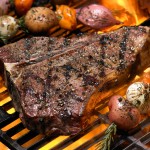I read dueling articles in the Wall Street Journal, one appeared yesterday with the title "Beef Industry Carves a Course" and the other today titled "Why to Eat Like a Greek." So I wanted to go through the pros and cons of both.
Apparently the National Cattlemen's Beef Association came up with a new kind of MBA two years ago. This one isn't the traditional MBA, but instead stands for Masters of Beef Advocacy. Roughly 2,000 people have finished the program thus far, but that's only 10% of what the beef producer's group hopes to train.
This is not a 2+ year Master's degree, like some of our graduate students got; it's a six-session, one hour at a time online course on beef safety, beef nutrition, animal care, environmental stewardship, modern beef production and something called the beef checkoff. The last of those is a program started way back in 1985 where $1 a head is assessed on sales of live cattle and the states get half and the Cattleman's Beef Promotion and Research Board gets the other half.
Note the term "promotion." The WSJ article says the MBA program helps train beef-associated folk (chefs, butchers, feedlot operators and ranchers) in promoting and defending red meat.
The per capita consumption of beef and veal has fallen from a peak of 94 pounds in the 1976 to 62 pounds in 2009 and the new USDA guidelines suggest we replace some of the red meat in our diets with fish and other seafood. Many schools have instituted a "Meatless Monday" policy
One thing I hadn't heard about was that PETA (People for Ethical treatment of Animals) has a new program where models wearing only strategically placed lettuce leaves stand on street corners in towns across the country and hand out tofu hot dogs. Now that's a new approach.
I'm a long way from a vegan; we do eat beef and have a quarter cow in our freezer. The cow was raised with a small number of companions, grass-fed and grass-finished, so is lean meat.
In our case we also eat vegetarian meals on occasion and will spend four days with our other set of adult children, our former graduate students from India who are lacto-ovo vegetarians, next week.
Most of the time we eat what amounts to a Mediterranean diet with whole grain cereals, lots of fruits and vegetables, fish and relatively small amounts of animal fat. The other WSJ article mentioned a meta-analysis done by an Athens university on studies involving more than a half million people; they claim nearly a one third reduction in the risk of developing the metabolic syndrome (high BP, large waist circumference, high blood sugar, low levels of good cholesterol (HDL) and high triglycerides).
Okay, what are the cons I said I'd mention? Well to begin with I'm not sure the beef industry has changed much other than trying to increase their PR efforts. And the Mediterranian diet isn't much different from the increase fruits and veggies, eat less red meat. Same old, same old. I agree with the overall premises, but I'm not convinced that olive oil is an essential component.
So neither article changed my diet at all.

